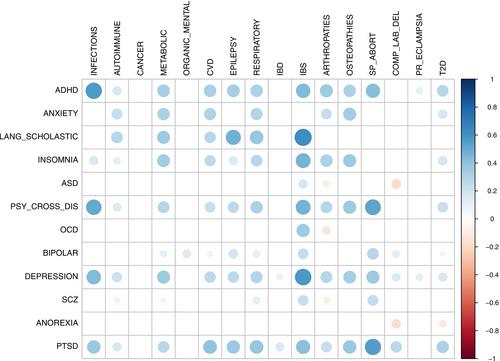Systematic Multi-Trait Study of Genetic Correlation and Causality Relationships Between General Medical Conditions and Mental Disorders
Abstract
Introduction
Increasing evidence has highlighted bidirectional associations between mental disorders and general medical conditions, with underlying causes ranging from lifestyle habits and side effects from medications to genetic contributions. Novel methods now provide a way to estimate the shared genetic underpinnings and the possibility of a causal relationship between conditions.
Methods
Using summary statistics from large genome-wide association studies of 16 categories of general medical conditions and 12 categories of mental disorders, we estimated pairwise genetic correlations between general medical conditions and mental disorders using LD score regression. For conditions with significant, positive genetic correlations, we used the latent causal variable (LCV) model to assess the evidence for a causal relationship between them.
Results
Ninety-five out of 192 pairs of conditions were significantly genetically correlated (q ≤ 0.05). Strong and significant correlations were found between conditions such as infections and a psychiatric cross-disorder phenotype (rg = 0.50, p = 1.33 × 10−6) and irritable bowel syndrome and depression (rg = 0.58, p = 1.50 × 10−16). In the causality analyses, statistically significant evidence for causality was obtained for seven pairs of conditions, including infections being causal to the psychiatric cross-disorder phenotype, metabolic disorders being causal to attention deficit/hyperactivity disorder (ADHD), post-traumatic stress disorder (PTSD) being causal to bone and cartilage disorders, arthropathies and epilepsy, obsessive–compulsive disorder (OCD) being causal to irritable bowel syndrome (IBS), and ADHD being causal to arthropathies.
Conclusions
Multiple pairs of general medical conditions and mental disorders were significantly genetically correlated, and for some pairs, there was genetic evidence for a causal relationship. Our findings can inform further molecular studies and clinical practice, raising awareness of the possible co-occurrence of these conditions.


 求助内容:
求助内容: 应助结果提醒方式:
应助结果提醒方式:


